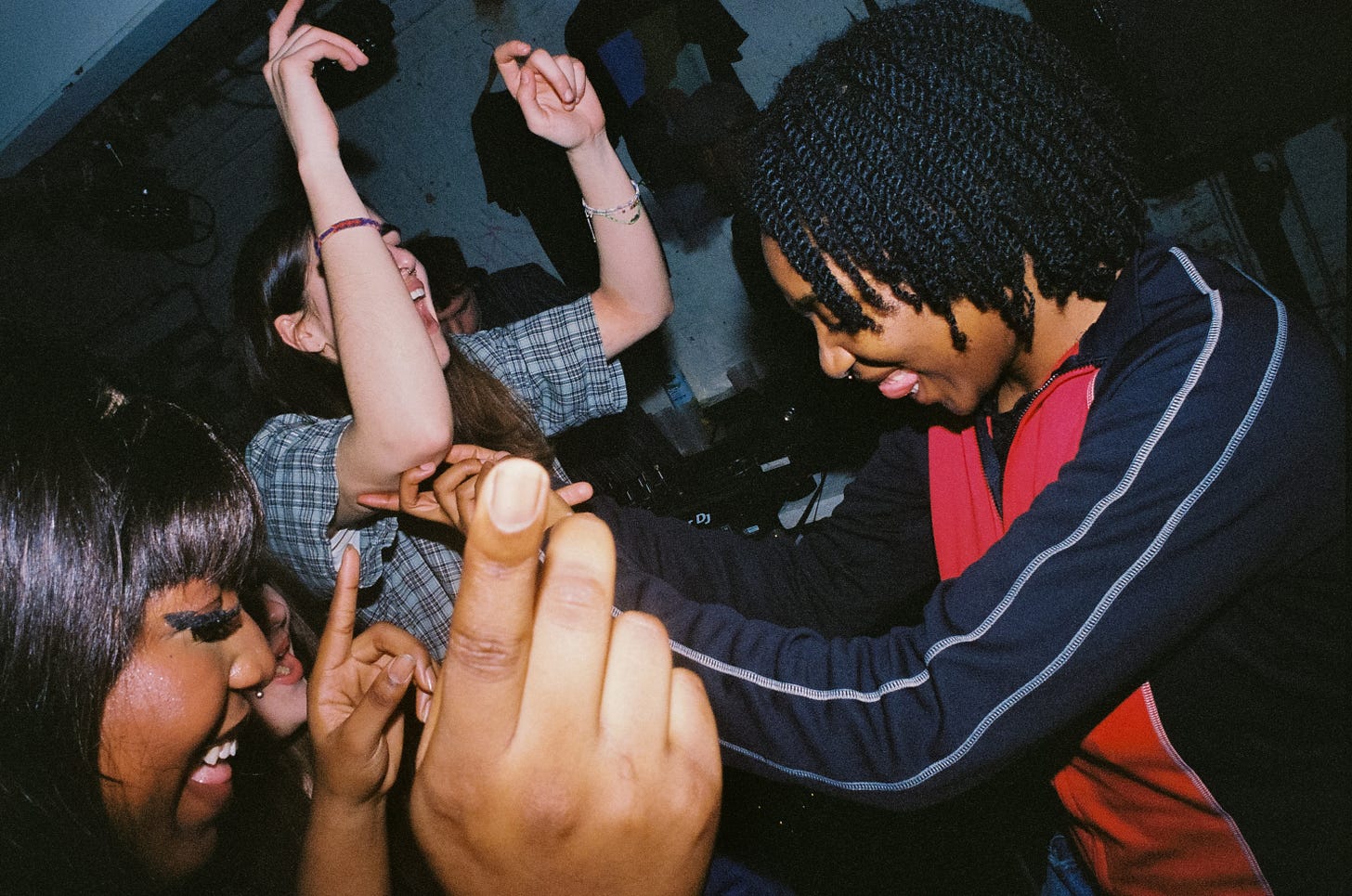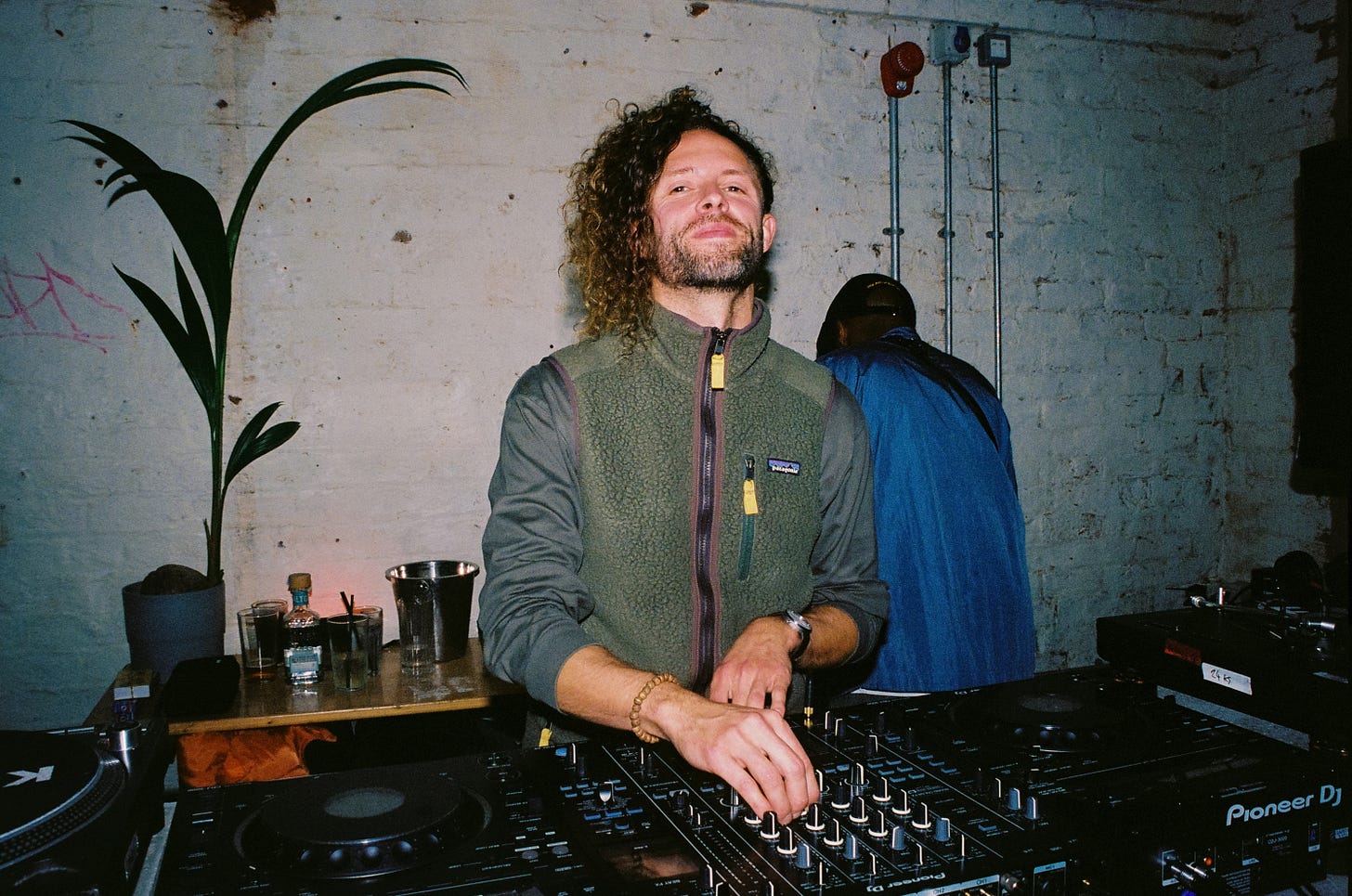(tech)no more dull crowds
Can’t dance, won’t dance: two nights bringing movement back to scouse nightlife
‘We wanted to make it a party for dancers,’ explains James, DJ and co-founder of Otra, ‘the first year or two establishing ourselves, Otra’s identity, and who we want to book - then once we’ve stamped our place in the scene, the next element is really facilitating the space to dance.’
While ‘no one dances anymore’ is precisely the type of outrageous statement worth breaking out in the pub, three pints in, just to spark an intense argument - especially when doubling down and really digging the heels in with increasing conviction in the clearly (not entirely) accurate statement - there is definitely a grain of truth to it.
Trying to do something about the static crowds, all intently focused on a DJ behind the decks, was one of the primary goals of Otra’s founders when they started to host their own nights.

A joint effort between Dharma Collective (James Sims & Kole Akeju) and RoBaSca (Ross Barr-Scragg), Otra stands out in Liverpool for bringing eclectic music, drawing on club music from around the globe, to the city. Critically they often hosting artists that are highly regarded in more (quote-unquote) niche circles for their first events in Liverpool.
Diversifying the sound and style of late-night music in the city was one goal, something they’ve met with the selection of artists they’ve already brought in to play - many of whom might be better described as selectors rather than DJs - but facilitating dance was also a key step.
‘Club culture’s become so imbued with a focus on the DJ at the front of the room,’ Ross explains. 'There’s a degree of theatre to digging through the bag and pulling out records that’s entertaining, but I do find it frustrating at times when there’s space and opportunity to dance and have conversations with people.’

Creating and curating that space, both physically and atmospherically, is a key goal ahead of any Otra event. Hosted at 24 Kitchen Street, chosen in part for it’s dancing potential (it has a ‘warmer’, intimate, feeling according to James and Ross), Otra fill the room with candles, lanterns, and artwork. They create, in James’ words, ‘an organic analogue vibe.’
A vibe, they hope, makes for a warmer space, one that feels intentional. In other words, it doesn’t feel like a space where the goal is to get absolutely off your tits. Instead, the hope is to create a comfortable space to coalesce around music and, maybe, start to move.
They are not, though, the only organisers thinking about making sure audiences are comfortable tapping into dance and movement; dance is an integral part, too, of Strike a Pose, a night hosted at Quarry in support of striking workers.
It’s origin story, as told by one of many involved in the night, Kieran Callanan, couldn’t be further than Otra’s: ‘Strike a Pose was just never supposed to be a club night or a variety show or anything; it was just an idea we had one time; a group of us had been out and had really good fun dancing and wondered how we could do that again.’
The result is eclectic, featuring three performance slots before any DJs take to the stage. Between each performance, a dance troupe takes over with short choreographed pieces.
Where it does share a similarity with Otra is in wanting to create a space and atmosphere for dance.
For Strike a Pose, where the music isn’t so crucial to establishing the night’s identity, having dance and performance as an integral part of the run-up to the disco-proper is a key way to break down the barriers some might feel towards free movement.
‘If dance is the performance before the disco,’ Kieran explains, ‘of course you’re going to dance differently.’

‘It’s all about normalising dance, movement, whatever,' adds Rebecca (also with Moon Cup Theatre), who assembles the troupe ahead of each night from volunteers collected from a vast WhatsApp group of enthusiasts. It’s less about saying people should dance, but more about making giving it a go more attainable, whether that’s in the crowd or quite literally getting involved in the troupe.
The theatricality of Quarry as a venue (have you seen those curtains?) is a key element to Strike a Pose’s approach, which does have more of a focus on performance, but the hope is to take performers and audiences on a shared journey. The organisers are quick to point out that they don’t use the stage too much but try to break down those barriers, creating a community as much as anything.
In fact, community is a central part of discussions with both the Otra and Strike A Pose teams, gathering distinctive crowds.
For Rebecca, feeling like part of a group is ‘fundamental to having fun on a night out; feeling like it’s just great mates means feeling more comfortable to actually just dance and have a good time. But you do have to grow it over time.’

It’s a sentiment shared by James and Ross; they can shape the space, they can select the music, but expanding the dance element of the evening is a longer process, though they’re starting to see the difference between mixing at other nights, typically more electronically driven, across the city and at their own events.
While there’s still hesitancy, they think they’re starting to see a change. For people not already accustomed to dancing on a night out, which, again, let’s be honest, is a good chunk of even the most committed nightlife purveyors, that can be completely daunting.
In some crowds, Ross points out that starting to move and inviting others to join doesn’t automatically mean that it’s the easiest thing in the world.
‘So you can see they’re keen to move,’ he explains, ‘but they’re not necessarily confident or knowledgeable enough yet to dance back with you.’ Quite simply, there isn’t a particularly strong dance culture in Britain, as in other countries, that can help people feel like they’ve got the basics. That can mean that people feel like they ‘don’t speak the same language.’

For Strike a Pose, they’re keen to have people move freely, but for Otra, since their nights are typically focused on more precussive music, be that funk, cumbia, or kwaito, the nights often lend themselves to certain families of dance and movement based on the foundation of a two-step. For Ross, it’s important to create a space where people can 'start teaching one another phrases from the many different dances and languages.’
But ultimately, between the two nights, the message is clear: get out, join the party, and see you on the dance floor.
N.B. - Both Strike a Pose and Otra are coincidentally taking place on Friday. Anyone wanting to compare and contrast could conceivably dash between the Baltic and the North Docks tomorrow night.
Power to you if you try it, please report back.
Get down on it:
25/07 - TRiBE w/ K.O.J (Kaz Stockroom)
26/07 - Tories Can’t Dance w/ Astles (The Jac)
26/07 - Otra w/ Musclecars (Kitchen St)
26/07 - Strike a Pose (Quarry)
26/07 - La Potion Pride w/ Or:la and Lauren Lo Sung (Meraki)
02/08 - Satin Beige (Fandisha)
02/08 - Fre.Que.Ncy (Kitchen St)
03/08 - Yo La Tengo (Content)
07/08 - Neuwen Afrobeat (Future Yard)
On repeat this week:
Liit - Çantamarta, rusowsky
How did you get here - Antony Szmierek (Bandcamp)
A Roadman’s Tale of Home - KOJ (Bandcamp)
Taxi Bamako - Amadou & Mariam (Bandcamp)

